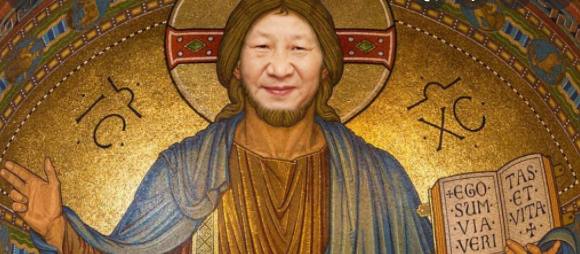Virendra Pandit
New Delhi: After obliterating traditional, identifiable designs of countless Muslim mosques and Christian churches across the People’s Republic of China (PRC) in recent years, President-for-Life Xi Jinping has unveiled the next phase of ‘Sinicization’ of foreign religions to promote ‘national security’.
Atheist China has, for long, controlled foreign-born religions—Buddhism, Christianity, and Islam. The new angle to Xi’s call is ‘national security’, showing Beijing’s attempts to whip up a nationalist frenzy—the way Soviet leader Josef Stalin did in the early 1940s to galvanize the Russians against Nazi Germany.
If Beijing launches an offensive against Taipei to ‘reunite’ the island nation of Taiwan under its ‘One China’ policy, the nationalist fervor could come in handy. If the West retaliates, Beijing would claim interference by a ‘foreign’ Christian alliance against China’s ‘reunification’.
The Communist Party of China (CPC) apprehends foreign religions, even online, and especially Christianity, fearing subversion of its authoritarian rule. It has precedence to learn from: in Poland where the Church supported the Solidarity movement led by factory workers’ leader Lech Walesa, which overthrew Communist rule in 1989.
Once upon a time, the Communists condemned nationalists as bourgeoise. But Xi Jinping has called for more efforts to enhance the recognition of the motherland, the Chinese nation, the Chinese culture, the CPC, and socialism with Chinese characteristics among religious personages and believers.
His call for ‘national security’ is also an attempt to camouflage the people’s growing disenchantment with the CPC. China is using nationalism as a deodorant to hide the CPC’s stink.
The media reported this week that Xi, 68, directed officials to tighten the State’s control over religious affairs in the country, “sinicize” alien faiths, and force them to toe the ruling CPC’s policies.
Ideologically, the CCP is ‘atheist’ but allows religions. According to an official White Paper (2019), China has about 200 million believers, mostly Buddhists in Tibet. Other minorities include 38 million Protestant Christians, 6 million Roman Catholics, and 20 million Muslims. Thus, only 264 million people, out of a population of 1,400 million, officially follow a religion. The PRC has about 140,000 places of worship.
President Xi Jinping has concentrated all powers in his hands. He heads the CPC, and the People’s Republican Army (PLA) as well. Still, he seems apprehensive of a revolt against his regime! It can control democratic forces in Hong Kong, but what about religious congregations?
“It is necessary to improve the democratic supervision of religious leaders, and push for the rule of law in religious work, and carry out in-depth publicity and education about the rule of law,” he was reported as saying at a national conference on work related to religious affairs last weekend.
The conference, which the top CPC leadership attended, was the first since 2016 and set the parameters on China’s religious affairs and their regulation over the next few years.
Xi said China will further promote “Sinicization of religion”, with a focus on strengthening control of online religious affairs, pointing out that it is imperative to uphold the principle of developing religions in the Chinese context, state-run Xinhua News Agency reported.
The CPC’s policy on freedom of religious belief should be fully and faithfully implemented and religious groups should stand as a bridge and a bond connecting the party and the government with people from religious circles and the vast number of religious believers, he said.
According to the Hong Kong-based South China Morning Post, the conference was held against the backdrop of widespread accusations of repressive control of Christians and Muslims in China, as well as the country’s increasing tight supervision over religions. In November, the US designated China, besides other nations, as “countries of particular concern” for violations of religious freedom. Also, China has for years been accused of suppressing the Uighur Muslims in Xinjiang province, amounting to their genocide.
“We should guide believers and religious personages to cultivate core socialist values and put them into practice and promote Chinese culture, “, Xi said.
We should carry religious activities out within the scope stipulated by the laws and regulations, and should not impair the health of citizens, offend public order and good morals, interfere with educational, judicial, and administrative affairs and social life, he added.

